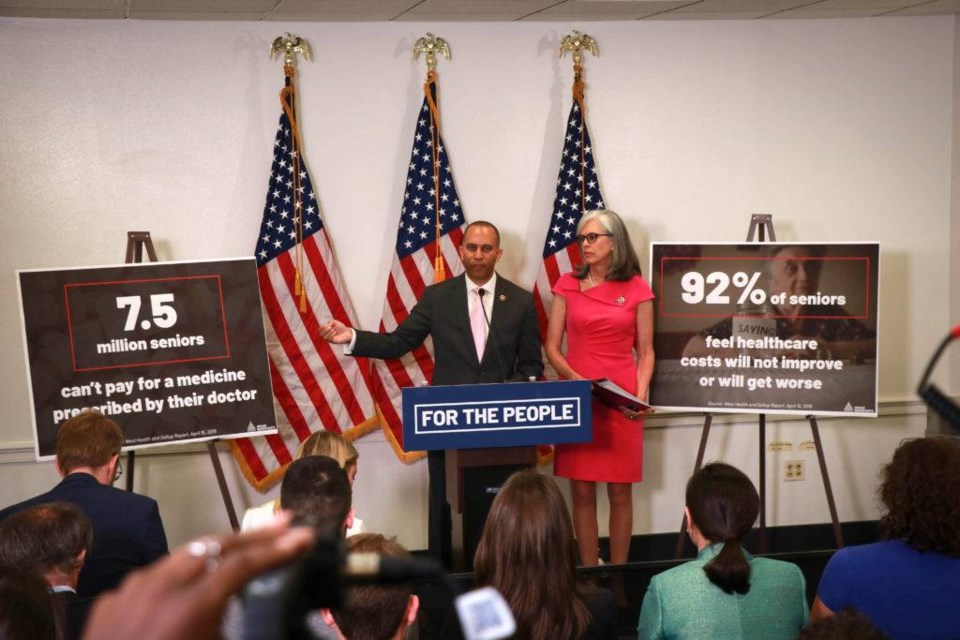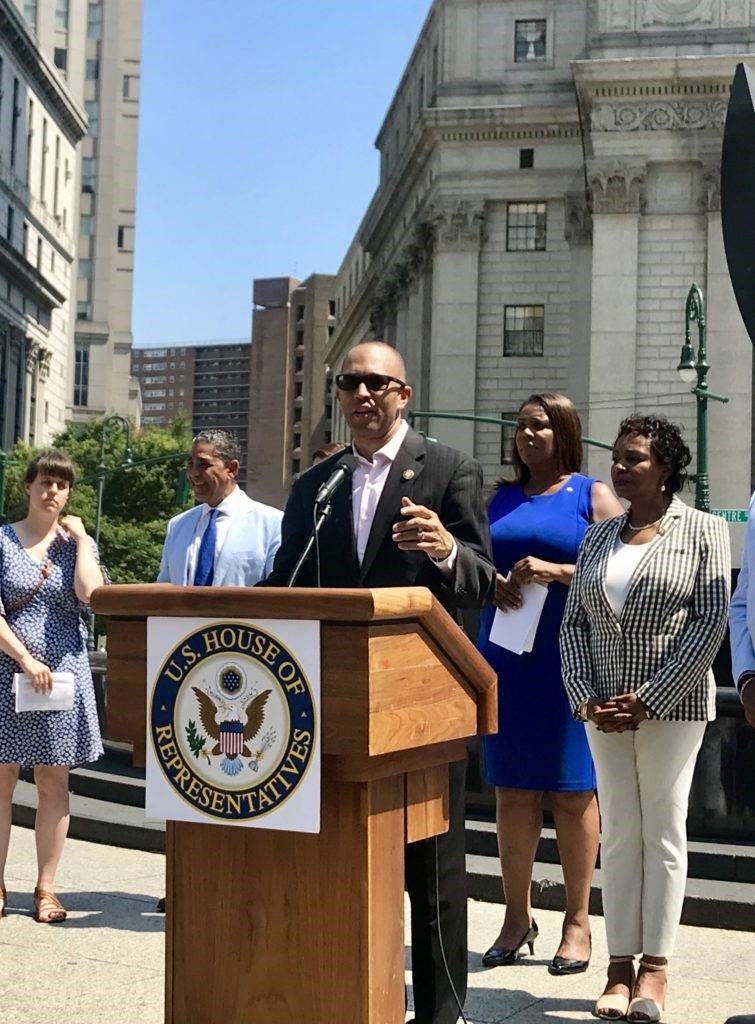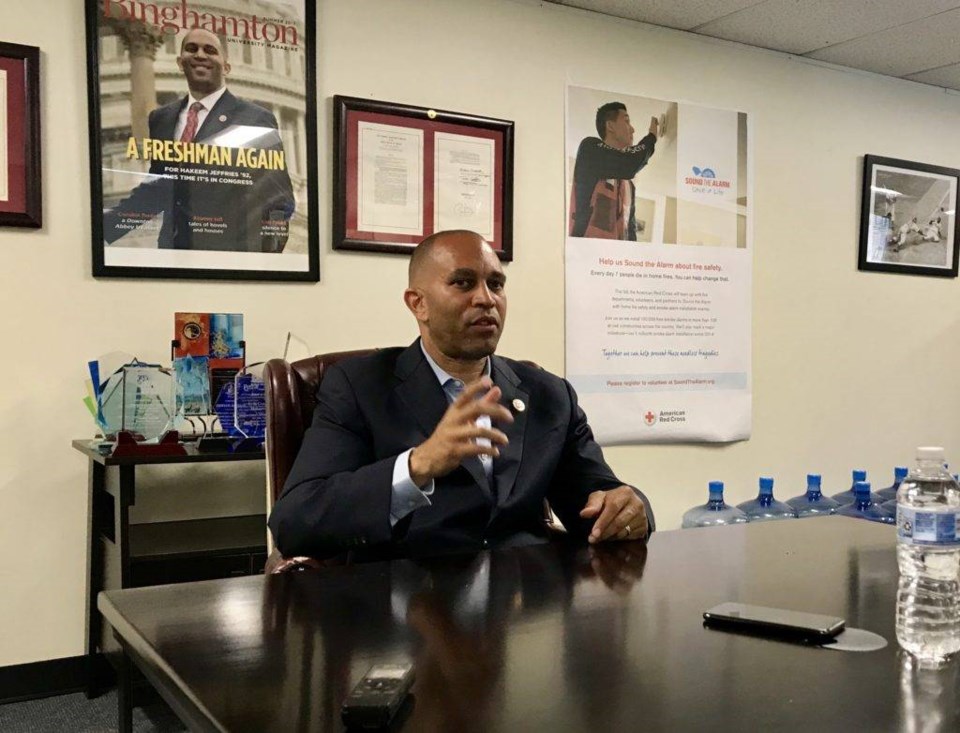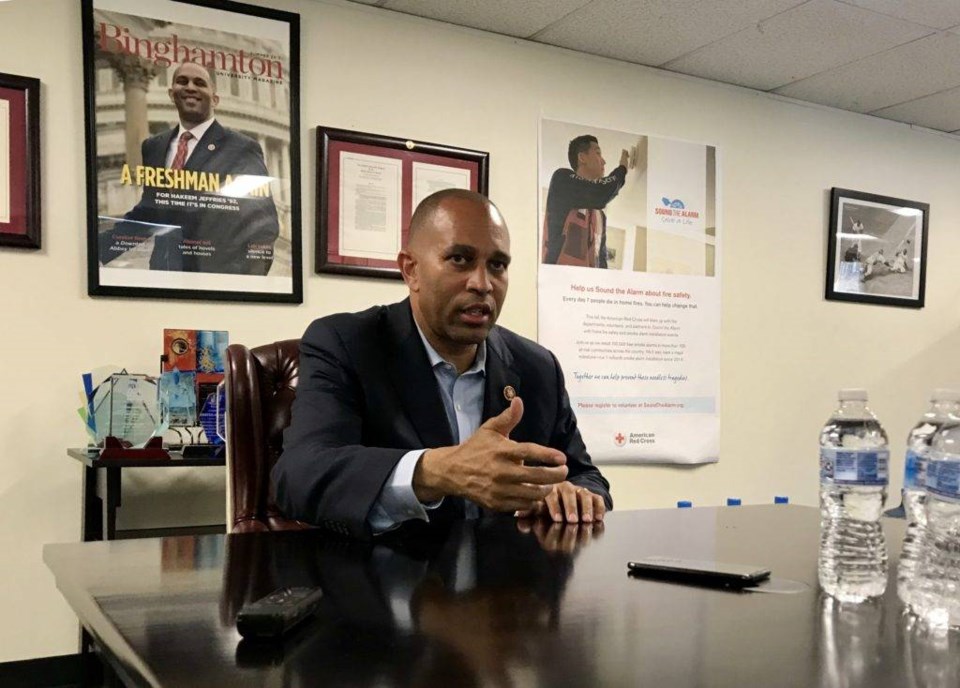House Democrats remain committed to lowering healthcare costs and working on an infrastructure plan despite the challenges the Trump Administration and the GOP-led Senate under Majority Leader Mitch McConnell pose, said Congressman Hakeem Jeffries (NY-08) on Wednesday during a roundtable at his Fort Greene office.
The chair of the House Democratic Caucus invited local journalists to discuss issues ranging from immigration reform to gun control laws, the decriminalization of marijuana, which he believes could be the next step for criminal justice reform, as well as how House Democrats plan to pursue their legislative agenda despite the current polarization that dominates Washington politics.
Regarding healthcare, Jeffries believes that the fastest and most promising way to get a grip on the country's ballooning healthcare costs is by lowering drug prices. Republicans, who are still touting plans to repeal the Affordable Care Act, are more inclined to deal with that issue, he said.
"Under the current configuration of the House and the Senate, the most reasonable pathway to provide immediate relief to the American people runs through trying to drive down the high cost of prescription drugs by aggressively confronting the anti-competitive racketeering of big pharma."
"Under the current configuration of the House and the Senate, the most reasonable pathway to provide immediate relief to the American people runs through trying to drive down the high cost of prescription drugs by aggressively confronting the anti-competitive racketeering of big pharma," said Jeffries who has sponsored legislation to release generic, more affordable products faster to the market.
In response to the various health insurance reform plans that have been presented by both House Democrats and Democratic presidential hopefuls, he is a proponent of "aggressively building on the Affordable Care Act." Medicare for All, which he previously called "appropriately aspirational, could be one way to achieve that. Jeffries is currently looking for input from local community stakeholders and healthcare institutions like Interfaith Hospital and Brookdale Hospital, which serve a large population of uninsured and underinsured patients and depend on government support, to gauge how the model would affect them.

"One of the reasons why safety-net hospitals like Interfaith and Brookdale struggle financially is because they are not adequately reimbursed by the government for the care that they provide," said Jeffries. "That's not necessarily a reason not to pursue a comprehensive proposal like Medicare for All. But if we go down that road, we're going to have to find ways to make sure that the safety-net hospitals are being reimbursed at a rate that will allow them to sustain themselves and provide high-quality care."
Infrastructure, traditionally a non- partisan issue, is another area where Democrats and Republicans should be able to work with each other. Talks, however, have been stalled by "the president's temper tantrums," the congressman said.
"The obstacle to enacting an infrastructure plan seems to be the president's inability to see things through any lens other than his own narcissistic view of the world."
"For the people that I represent, a real infrastructure plan would involve us investing at least $70 billion in fixing our crumbling public housing," said Jeffries. "The pathway to improving the lives of the public housing residents that I serve runs directly through an infrastructure agreement. Yet, the obstacle at the moment seems to be the president's inability to see things through any lens other than his own narcissistic view of the world."
Fixing NYC's deteriorating public housing will require the federal government to step in, he added.
"The only way for us to deal with that issue in a humane and comprehensive fashion is for the federal government to provide a significant infusion of resources, which I'm working hard to accomplish," said Jeffries. "At the same time, we need accountability at the local level to make sure the money is spent well."

Regarding immigration, he questioned that the "Republican sycophants, who dominate the Senate, are willing to show some leadership on this issue given the Trump xenophobic playbook."
One of the Trump Administration's most recent assaults on immigrant communities, the Public Charge rule change, designed to deter migrants in need from seeking government support, will likely be challenged through lawsuits from advocacy groups. Congress, meanwhile, can try to use its appropriation process to provide or deny funding for programs and agencies to move the "conversation around immigration in a better direction," Jeffries said.
"We have a broken immigration system that clearly is in desperate need of reform. The only way to proceed in that regard is to do it in a bipartisan way," he said. "We sent the Dream and Promise Act over to the Senate months ago, which was bipartisan legislation that will create a robust pathway towards citizenship for millions of Dreamers, but Mitch McConnell refuses to bring it up."
This year, the House has passed over 100 bills, many of which McConnell subsequently buried. Among those has also been comprehensive gun control legislation, said Jeffries. One of the bills, expected to come back in the focus of D.C. lawmakers after the August recess, would mandate federal criminal background checks on all gun sales, which would not only curb access to military-style assault weapons but also regular handguns. The latter account for approximate 64 percent of all shootings in the country and are a major problem in the inner cities, even in New York State which has some of the countries toughest gun laws.
"The best thing we can do is to pass universal criminal background check legislation to ensure that people with criminal intentions have the greatest degree of difficulty to acquire weapons."
"Our big challenge in New York are the lax gun laws in other parts of the country. Most of the guns that are used to commit crimes in our neighborhoods come from Florida, Georgia, North Carolina, South Carolina, Virginia or Pennsylvania, which all have lax gun laws," said Jeffries. "The best thing we can do is to pass universal criminal background check legislation to ensure that people with criminal intentions have the greatest degree of difficulty to acquire weapons."
Many issues like stricter gun laws and comprehensive immigration reform "will only get settled with finality by defeating him in the Senate Republican majority in November of 2020," he added.

And what should Democrats do, who often are depicted as playing too nice with the other side, if they regain control of not only the House and the Senate, but also the White House in November 2020?
"If we obtain complete control of the government, we have to put our foot on the gas pedal and get as many progressive things done as humanly possible. We cannot afford to sit back," concluded Jeffries. "What we have seen is that the other side will aggressively move on their priorities, even during a lame-duck session when the American people have voted them out of office. We can't fight with one hand behind our backs and be cautious, after having just obtained complete control of the government, which could be possible in 2021."




